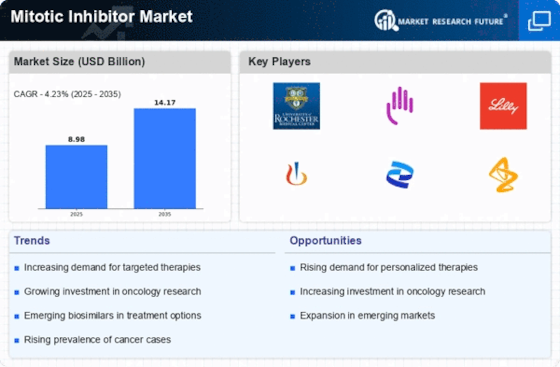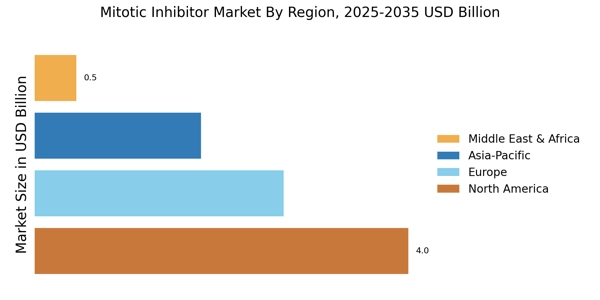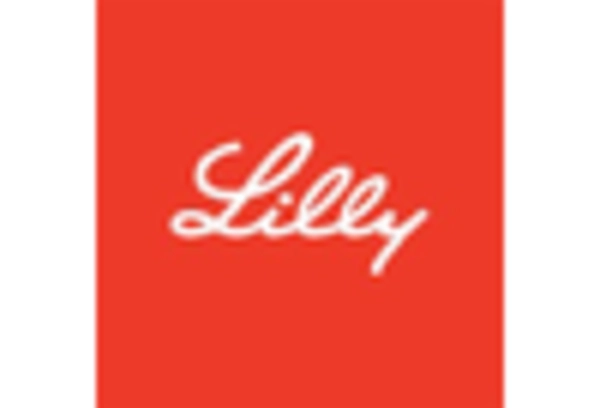Rising Cancer Incidence
The increasing incidence of cancer worldwide is a primary driver for the Mitotic Inhibitor Market. As cancer remains a leading cause of mortality, the demand for effective treatment options continues to rise. According to the World Health Organization, cancer cases are projected to reach 29.5 million by 2040, indicating a substantial need for innovative therapies. Mitotic inhibitors, which target cell division, play a crucial role in cancer treatment regimens. The growing awareness of cancer prevention and treatment options further propels the market, as healthcare providers and patients seek advanced therapies to combat this disease. This trend suggests that the Mitotic Inhibitor Market will likely experience sustained growth as new therapies are developed and approved.
Growing Geriatric Population
The aging population is a significant factor driving the Mitotic Inhibitor Market. As individuals age, the risk of developing cancer increases, necessitating effective treatment options. The United Nations projects that the number of people aged 65 and older will reach 1.5 billion by 2050, creating a larger patient pool requiring cancer therapies. Mitotic inhibitors are often integral to treatment plans for older patients, who may have specific health considerations. This demographic shift indicates a growing demand for tailored cancer therapies, which could lead to increased market opportunities for mitotic inhibitors. Consequently, the Mitotic Inhibitor Market is likely to expand in response to the needs of this aging population.
Advancements in Drug Development
Technological advancements in drug development are significantly influencing the Mitotic Inhibitor Market. The integration of high-throughput screening and molecular biology techniques has accelerated the discovery of novel mitotic inhibitors. Recent data indicates that the pharmaceutical industry invested over 200 billion in research and development in 2023, with a substantial portion allocated to oncology. This investment fosters innovation, leading to the introduction of more effective and targeted mitotic inhibitors. Furthermore, collaborations between academic institutions and pharmaceutical companies enhance the research landscape, potentially resulting in breakthrough therapies. As these advancements continue, the Mitotic Inhibitor Market is poised for expansion, driven by the introduction of new and improved treatment options.
Regulatory Support for Oncology Drugs
Regulatory bodies are increasingly supportive of the development and approval of oncology drugs, which positively impacts the Mitotic Inhibitor Market. Initiatives aimed at expediting the approval process for cancer therapies have been implemented, allowing for faster access to innovative treatments. For instance, the FDA's Breakthrough Therapy designation has facilitated the rapid development of several mitotic inhibitors in recent years. This regulatory environment encourages pharmaceutical companies to invest in research and development, knowing that their products may receive expedited review. As a result, the Mitotic Inhibitor Market is likely to see a surge in new product launches, driven by this supportive regulatory framework.
Increased Focus on Personalized Medicine
The shift towards personalized medicine is reshaping the Mitotic Inhibitor Market. Personalized medicine aims to tailor treatments based on individual patient characteristics, including genetic profiles. This approach enhances treatment efficacy and minimizes adverse effects, making it particularly relevant in oncology. The market for personalized medicine is expected to reach 2.5 trillion by 2026, reflecting a growing trend in healthcare. Mitotic inhibitors, when combined with biomarker testing, can provide targeted therapies that align with patients' unique profiles. This trend suggests that the Mitotic Inhibitor Market will likely benefit from the increasing adoption of personalized treatment strategies, leading to improved patient outcomes.

















